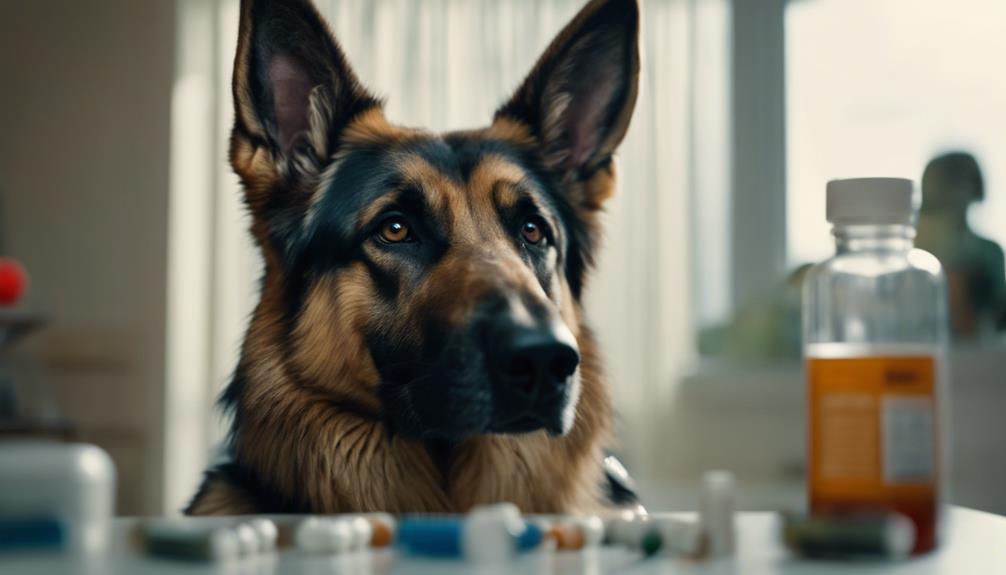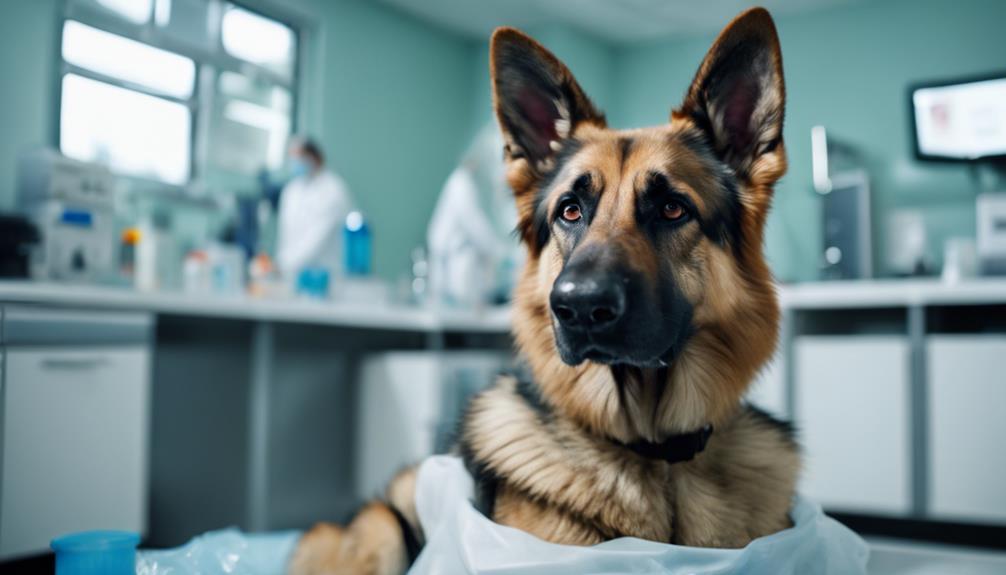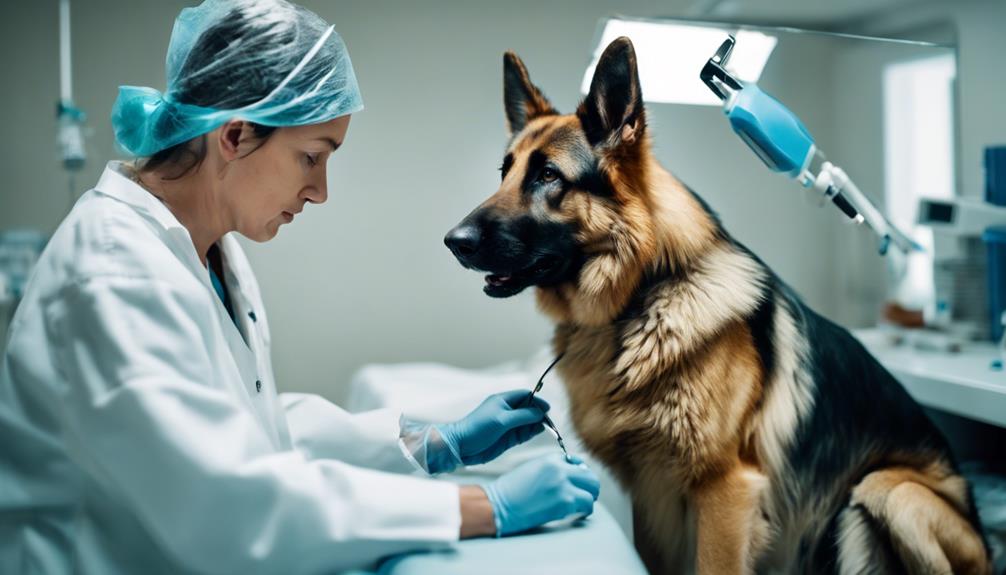🐾 Paw-some Partnership Alert! 🐾
As a pack of German Shepherd enthusiasts at MixGermanShepherd.com, we're always sniffing out the best products for our furry friends. Guess what? When you fetch something from Amazon through our links, we earn a little treat! 🦴
Dealing with parasites in German Shepherd mixes is like navigating a labyrinth; it requires patience and strategic planning. As a responsible pet owner, you want to ensure the well-being of your furry companion. But what happens when unseen threats lurk within? Stay tuned to discover effective strategies and practical tips to combat parasites in German Shepherd mixes, safeguarding their health and happiness.
Key Takeaways
- Regular fecal tests are crucial for detecting parasites early in German Shepherd mixes.
- Transmission risks include contaminated environments and contact with infected animals.
- Prompt veterinary care is essential for diagnosing and treating parasitic infections effectively.
- Tailored deworming medications and preventive measures can help keep German Shepherd mixes parasite-free.
Identifying Common Parasites in German Shepherds

To effectively identify common parasites in German Shepherds, start by recognizing the signs and symptoms that may indicate their presence in your dog. Parasites such as roundworms and hookworms are prevalent in German Shepherds and can lead to symptoms like diarrhea, vomiting, weight loss, and bloody stool. Regular fecal tests are crucial for detecting these parasites early and initiating prompt treatment. If left untreated, these parasites can cause severe health issues in German Shepherds. Treatment for parasites in German Shepherds typically involves deworming medications prescribed by your veterinarian.
Prevention plays a significant role in managing parasites in German Shepherds. Implementing effective parasite control measures, such as administering preventive medications and maintaining proper sanitation practices, is essential. Additionally, since parasites like roundworms can be transmitted to humans, it is crucial to focus on prevention to safeguard both your pet and your family. By staying vigilant, conducting regular fecal tests, and following your veterinarian's recommendations, you can help protect your German Shepherd from the harmful effects of parasites.
Understanding Parasite Transmission

German Shepherd mixes contract parasites through various means, including exposure to contaminated sources and interactions with infected animals. Understanding parasite transmission in German Shepherd mixes is crucial for their well-being. Here are some key points to consider:
- Parasite transmission can occur through ingestion of infected feces, increasing the risk of infestation.
- Grooming contaminated fur can introduce parasites to a German Shepherd mix, leading to potential health issues.
- Interactions with infected animals, such as through playing or shared spaces, pose a risk of parasite transmission.
- Contaminated soil and environments where other infected animals have been can serve as sources of parasites for German Shepherd mixes.
To safeguard your pet, regular parasite screenings and implementing preventive measures are essential. By staying informed about parasite transmission pathways and taking proactive steps to protect your German Shepherd mix, you can help maintain their health and well-being.
Symptoms of Parasitic Infections

Understanding the symptoms of parasitic infections in your German Shepherd mix is crucial for promptly addressing potential health issues and ensuring their well-being. Parasitic infections can manifest in various ways in German Shepherd mixes, including diarrhea, vomiting, lethargy, and weight loss. Infected dogs may also exhibit scooting behavior, abdominal pain, and a distended abdomen. If left untreated, these infections can progress to more severe symptoms such as bloody stool, decreased appetite, dehydration, weakness, and anemia. It is essential to monitor your dog for any signs of parasitic infections and seek veterinary care promptly for an accurate diagnosis and appropriate treatment. By being vigilant and recognizing these symptoms early on, you can help prevent further complications and ensure the health and happiness of your German Shepherd mix. Remember, your veterinarian is your best ally in providing the necessary care and support for your furry companion.
Deworming German Shepherd Mixes

Regularly deworming your German Shepherd mix is crucial in preventing and treating parasite infestations. Here are some essential points to consider when deworming your furry companion:
- Veterinarians typically prescribe deworming medications tailored to the specific type of parasites affecting your German Shepherd mix.
- Deworming schedules may vary based on factors such as your dog's age, health status, and the likelihood of parasite exposure.
- It is vital to adhere to the instructions provided by your vet regarding deworming to ensure the treatment is effective.
- Consistent deworming plays a significant role in maintaining the overall health and well-being of your German Shepherd mix.
Types of Worms in German Shepherds

German Shepherds are susceptible to various types of worms, including roundworms, hookworms, whipworms, tapeworms, and heartworms. Roundworms such as Toxocara canis and Toxascaris leonina are particularly common in this breed. Hookworm infestations can lead to serious health issues like anemia if not promptly addressed.
Common Worm Species
When it comes to the types of worms that can affect German Shepherds, common species include roundworms, hookworms, whipworms, tapeworms, and heartworms. These worms pose different risks to your German Shepherd mix:
- Roundworms like Toxicara canis and Toxascaris leonina are prevalent in German Shepherds.
- Hookworms can cause anemia in German Shepherds if left untreated.
- Whipworms in German Shepherds can lead to bleeding and abdominal pain.
- Heartworms, though less common, can be fatal if not prevented or treated in German Shepherds.
Understanding the characteristics and risks associated with each type of worm is crucial in safeguarding the health of your beloved German Shepherd mix.
Symptoms and Treatment
To effectively address worm infestations in your German Shepherd mix, recognizing the symptoms and understanding the appropriate treatment for each type of worm is essential. German Shepherds can be susceptible to various worms such as roundworms and hookworms. Symptoms of worm infestation in German Shepherds may manifest as coughing, diarrhea, vomiting, lethargy, or a swollen abdomen. If you suspect your dog has worms, prompt treatment with deworming medications prescribed by a vet is crucial. Regular fecal tests are necessary for diagnosing and monitoring worm infestations to ensure timely intervention. Additionally, preventive measures like avoiding raw meat, using natural mosquito repellents, and maintaining a healthy diet can help protect your German Shepherd mix from worm infestations.
Recognizing Signs of Parasites

To recognize signs of parasites in your German Shepherd mix, observe for symptoms such as diarrhea, vomiting, lethargy, and abdominal swelling. Keep an eye out for itchiness, skin irritation, or changes in behavior that could indicate a parasite issue. Monitor weight, appetite, energy levels, coughing, scooting, or visible worms in feces as potential indicators of parasites and seek veterinary advice promptly.
Symptoms of Parasites
If your German Shepherd mix is displaying symptoms of parasites, such as diarrhea, vomiting, lethargy, and weight loss, it's crucial to act promptly. Recognizing signs of parasites in dogs can help you address the issue before it worsens. Keep an eye out for these symptoms:
- Distended abdomen
- Skin issues
- Changes in appetite
- Visible worms in feces
These signs may indicate a potential parasite infestation in your furry companion. Monitoring your German Shepherd mix for any unusual behaviors or physical changes is essential in catching and treating parasites early. If you notice any of these symptoms, consult your veterinarian for proper diagnosis and treatment.
Treatment Options
Recognizing the signs of parasites in your German Shepherd mix, such as diarrhea, vomiting, and a distended abdomen, is crucial in determining appropriate treatment options. If you notice symptoms like scooting, weight loss, or bloody stool, it's important to take action promptly. Consult a vet for fecal tests and examinations to accurately diagnose and treat parasite infestations in your German Shepherd mix. Early detection is key, so regularly check for signs like lethargy, coughing, swollen abdomen, and changes in appetite. Remember, swift treatment not only benefits your pet but also prevents the spread of parasites to other animals and humans. Maintain a clean living environment and follow preventive measures to reduce the risk of parasite infestations.
| Signs of Parasites in German Shepherd Mixes | ||
|---|---|---|
| Diarrhea | Vomiting | Distended Abdomen |
| Scooting | Weight Loss | Bloody Stool |
| Lethargy | Coughing | Swollen Abdomen |
| Changes in Appetite | Prompt Treatment | Vet Consultation |
Natural Remedies for Parasites

When dealing with parasites in German Shepherd mixes, incorporating natural remedies such as black cumin seed, thyme, parsley, chamomile, and olive leaf can be effective in expelling these unwanted intruders.
- Black Cumin Seed: Known for its antiparasitic properties, black cumin seed can help support the immune system in fighting off parasites.
- Chamomile: Chamomile is beneficial for soothing the digestive system and promoting overall gut health in German Shepherd mixes.
- Thyme: Thyme is a natural remedy that can be effective in combating parasite infestations when administered in specific dosages and methods.
- Olive Leaf: Olive leaf extract is recognized for its antimicrobial properties, aiding in the elimination of parasites while supporting the overall health of your dog.
These natural remedies offer a holistic approach to dealing with parasites in your German Shepherd mix, providing a gentle yet effective way to support your pet's well-being. Always consult with a veterinarian before introducing new remedies to ensure they are suitable for your dog's specific health needs.
External Parasite Prevention Tips

Regularly using vet-approved flea and tick preventives is essential to safeguard your German Shepherd mix from external parasites. These preventives come in various forms such as spot-on treatments, collars, or oral medications. Check your dog's fur routinely for any signs of fleas and ticks, especially after spending time outdoors where they can easily pick up these parasites. Additionally, maintaining cleanliness in your dog's living areas is crucial for parasite prevention. Regularly vacuuming, washing bedding, and treating outdoor spaces help reduce the risk of infestations. It's important to avoid using over-the-counter flea and tick products without consulting your vet, as they may not be suitable for your German Shepherd mix and could potentially be harmful. If you're interested in natural remedies, consider options like diatomaceous earth or essential oils, but always seek guidance from your vet to ensure they are safe and effective for your dog. By staying proactive and following these tips, you can help protect your German Shepherd mix from external parasites.
Importance of Timely Veterinary Visits

Regular veterinary visits are essential for your German Shepherd mix to stay on top of parasite issues before they escalate. During these visits, your vet can conduct tests and exams to catch any problems early and provide timely treatment. By keeping up with scheduled check-ups, you can ensure your furry companion's health is well-maintained and protected against parasites.
Regular Vet Check-Ups
Scheduling timely veterinary visits plays a critical role in safeguarding the health and well-being of German Shepherd mixes by monitoring for and addressing potential parasite infestations early on. Regular vet check-ups offer essential benefits:
- Fecal tests and physical examinations enable the detection of parasites.
- Timely visits can prevent severe complications and ensure prompt treatment.
- Tailored prevention plans can be implemented based on individual risk factors.
- Consistent veterinary care contributes to the overall well-being of German Shepherd mixes.
Preventive Parasite Treatments
To effectively safeguard the health of your German Shepherd mix against parasites, timely veterinary visits are essential for implementing preventive treatments. Regular vet check-ups play a crucial role in the early detection of parasites, preventing severe infestations in German Shepherd mixes. During these visits, veterinarians can recommend preventive medications tailored to the specific parasite risks your dog faces, creating a personalized parasite prevention plan. By being proactive and administering preventive treatments at these veterinary appointments, you significantly reduce the risk of parasite-related health issues in your German Shepherd mix. Remember, early detection through routine veterinary visits is key to maintaining the health and well-being of your furry companion.
Early Detection Benefits
Ensuring timely veterinary visits for your German Shepherd mix is crucial for promptly identifying and treating parasite infestations. Regular check-ups enable vets to conduct fecal tests and screenings for parasites, ensuring early intervention. Timely veterinary visits can prevent the spread of parasites to other pets or family members. Early detection of parasites can minimize the risk of severe health complications for German Shepherd mixes. Veterinary visits play a crucial role in maintaining the overall health and well-being of your furry companion by addressing parasite issues early on. Remember, being proactive with veterinary visits can ultimately lead to a healthier and happier life for your German Shepherd mix.
Diagnostic Procedures for Parasites

When diagnosing parasites in German Shepherd mixes, various diagnostic procedures such as fecal tests, blood tests, skin scrapings, urine tests, and diagnostic imaging are commonly employed. Fecal tests are crucial for identifying intestinal parasites, while blood tests can help detect bloodborne parasites like heartworm. Skin scrapings may be necessary to pinpoint external parasites such as mites that could be affecting your German Shepherd mix. Urine tests play a role in diagnosing certain types of parasites that impact the urinary tract. Additionally, diagnostic imaging techniques such as X-rays or ultrasounds can be utilized to identify parasites in organs or tissues of German Shepherd mixes. Ensuring a thorough diagnostic process is essential for accurate parasites detection and subsequent treatment.
| Diagnostic Procedure | Description | Usage |
|---|---|---|
| Fecal Tests | Identify intestinal parasites through examination of feces | Essential for detecting internal parasites |
| Blood Tests | Detect bloodborne parasites like heartworm | Important for bloodborne parasite detection |
| Skin Scrapings | Necessary to identify external parasites such as mites | Crucial for identifying external parasites |
| Urine Tests | Assist in diagnosing parasites affecting the urinary tract | Helps in detecting urinary tract parasites |
| Diagnostic Imaging | Utilize X-rays or ultrasounds to identify parasites in organs | Useful for identifying parasites in organs |
Treatment Options for Parasites

Treatment options for parasites in German Shepherd mixes often involve the administration of deworming medications prescribed by a veterinarian. When addressing parasites in your German Shepherd mix, consider the following options:
- Multiple Rounds of Medication: Some cases may require several rounds of deworming medication to ensure complete elimination of parasites.
- Topical Treatments and Oral Medications: Commonly used methods to tackle external parasites like fleas and ticks in your German Shepherd mix.
- Advanced Treatments: Severe infestations may necessitate advanced treatments such as injections or specialized medications.
- Regular Follow-Up Appointments: Crucial for monitoring the progress and effectiveness of the parasite treatment in your German Shepherd mix.
Maintaining Parasite-Free Environment

To maintain a parasite-free environment for your German Shepherd mix, regularly implementing proper cleaning and prevention measures is essential. Clean and disinfect your home environment frequently to prevent parasite infestations. Use vet-approved products to treat and prevent parasites in your dog. Washing your dog's bedding regularly is crucial to eliminate any parasites that may be present. Additionally, incorporating a consistent grooming routine into your dog's care regimen will help you check for and remove any external parasites promptly.
For personalized recommendations on parasite prevention and treatment tailored to your German Shepherd mix, consult with your vet. They can provide guidance on the most effective vet-approved products to use and offer advice on maintaining a parasite-free environment. By following these guidelines and staying proactive in your approach to parasite prevention, you can create a safe and healthy living space for your beloved German Shepherd mix.
Frequently Asked Questions
How Do You Get Rid of Worms in a German Shepherd?
To get rid of worms in a German Shepherd, consult a vet for medication options. Incorporate natural remedies, dietary changes, and preventative measures like regular check-ups. Ensure parasite control with home treatments. Prioritize your pup's health.
How Do I Know if My German Shepherd Has Parasites?
To know if your German Shepherd has parasites, watch for symptoms like diarrhea, vomiting, or a distended abdomen. Check stool for worms. Consult your vet for testing and treatment. Consider preventive meds and hygiene practices.
How Can I Get Rid of Parasites in My Dog?
To get rid of parasites in your dog, focus on preventive measures like regular checkups and environmental hygiene. Consider natural remedies, dietary changes, and homemade treatments under veterinary care. Watch for behavioral symptoms and stay vigilant.
How Do You Deworm a German Shepherd?
To deworm a German Shepherd, consult a vet for the right medication dosage. Follow the prescribed schedule for treatment. Consider preventative measures like regular check-ups, diet changes, and over-the-counter options. Natural remedies and home treatments may also be beneficial.
Conclusion
As you navigate the intricate world of parasite management in German Shepherd mixes, remember that vigilance is your shield and proactive care is your sword. Just as a skilled shepherd tends to their flock with unwavering dedication, so too must you tend to your beloved companion. By staying informed, taking preventative measures, and seeking timely treatment, you can create a fortress of protection against the unseen foes that threaten your furry friend's well-being. Stay vigilant, stay strong, and may your bond with your loyal companion flourish in health and happiness.
